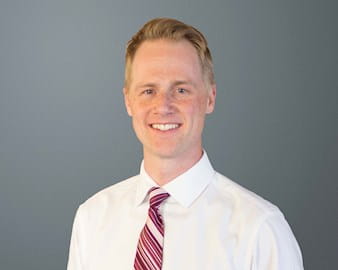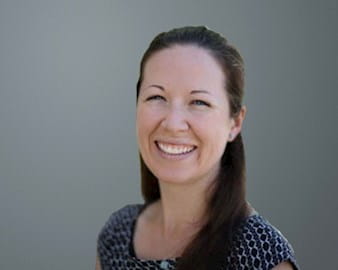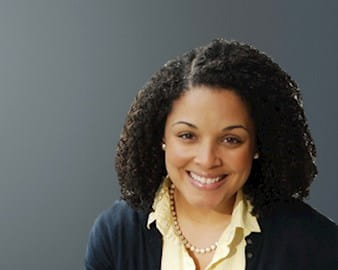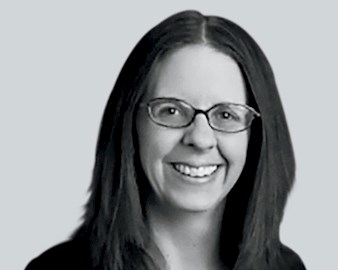
Booth alumni are tapping into their skills to rethink educational systems—and finding that the work brings personal rewards.
- By
- October 10, 2018
- Education

Booth graduates eager to make an impact are finding new ways to apply their MBA—by taking on one of the toughest challenges in the United States today.
A growing cadre of Booth alumni are gravitating toward the education sector and applying their business background in a variety of roles, all with the goal of making a difference in the lives of students.
It’s an area that badly needs more innovation. In the United States just 59 percent of students who enter a four-year college graduate within six years, according to data from the US Department of Education. And in 2015, 46 percent of scientists rated STEM education for grades K through 12 as being below average, according to the Pew Research Center.
For some alumni this less-than-stellar data offers an opportunity to take their careers to different corners of the education landscape—from nonprofit management and school leadership to consulting, investing, and edtech, to name just a few. The combination of addressing some of the nation’s most pressing problems while doing work that’s meaningful on a daily basis is a powerful draw.
Meet six alumni advancing bold ideas and envisioning new solutions for the classroom and beyond.

As a first-generation college graduate and the daughter of Mexican immigrants, Veronica Herrero, ’06, is eager to support students following the same path. “Once I started my career in education, I never looked back,” she said.
An early employee of One Million Degrees, Herrero uses her Booth education to help steer the 12-year-old Chicago-based nonprofit, which partners with community colleges. It provides services from tutoring and coaching to financial assistance and professional development, all with the goal of helping students adjust to college life and complete their degree. The organization embeds dedicated staff members on campuses to help students better acclimate to programs despite personal, academic, or financial hardships.
The need is large—about 60 percent of undergraduates enrolled in public institutions are community college students, Herrero added. And there’s plenty of room for impact. Nationally, only about one-third of students who attend community college go on to graduate. In Illinois the rate is closer to 20 percent, according to Herrero. Encouraging students to reenroll each semester is challenging.
“Many are making a daily trade-off between immediate needs, like work and providing for their families, and going to college, which has a delayed but greater payoff,” she explained.
While Herrero initially entered business school interested in nonprofits, she was able to explore a variety of careers at Booth, including an international summer internship opportunity. Spending a semester abroad at ESADE in Barcelona through the International Business Exchange Program broadened her view of what she could do after graduation.
“When I took the social impact and entrepreneurship courses there, it validated my aspirations and reshifted my focus,” she said.
“I’m incredibly excited about welcoming more Booth talent to our sector.”
— Veronica Herrero
After returning home, Herrero connected with Chicago Public Schools during a career fair and worked there for five years. She worked at the Urban Education Institute at the University of Chicago and joined One Million Degrees in 2013. Having an MBA as an advocate in the education field has also helped open doors for Herrero in unexpected ways. “A Booth degree gives you credibility with funders and donors,” she said.
Since joining One Million Degrees, Herrero has made it her mission to dig into the data in order to increase the effectiveness of the organization. First-year findings of a rigorous study they are conducting with UChicago Urban Labs shows a 23 percent increase in retention rates. “I’ve led the data-driven culture within our organization,” she said. “Booth prepared me to successfully drive our rapid growth trajectory, use data-driven strategies, and build a high-performing team.”
These days she’s spending more time giving back to the growing network of Booth alumni interested in education opportunities. She returned to the university to attend the UChicago Civic Leadership Academy and participated in Booth 20/20 to give advice and allay concerns of incoming students. In the past few years, “I’m seeing a growing number of Booth students who are interested in social impact work,” she said. “I’m incredibly excited about welcoming more Booth talent to our community and sector.”

What’s the most critical time that determines college success? It’s the postsecondary transition period, which includes the last two years of high school and the first year of college, said Jeff Nelson, ’14. He leads the Chicago-based nonprofit OneGoal, which works with students in low-income public high schools to increase college retention during the three-year postsecondary period and get more students to graduation day.
The retention problem can be invisible to high-income graduates, 67 percent of whom earn college degrees. By contrast only 22 percent of the population at the bottom of the economic ladder go on to graduate, he added.
Ultimately, OneGoal’s mission is to close the college-degree divide between students from high and low-income communities, said Nelson, who joined in 2007 as the nonprofit’s first employee and fourth cofounder.
Several years later, as OneGoal was transitioning from targeting local Chicago high schools to serving students across the nation, Nelson was completing Booth’s Evening MBA Program. He was able to directly connect his coursework as a student with the skills he applied at work the next day.
“I was going to school at night and taking small group exercises from the evening and turning around to use them the next day at a board meeting or a pitch meeting,” he said. “The impact of the program was a pretty profound one.” Taking a course on negotiations and learning how to build an effective P&L were crucial, he recalled. And an entrepreneurship class taught by Groupon cofounders Brad Keywell and Eric Lefkofsky “was a crash course in almost every single strategic decision we were facing as a company,” he added.
“The young people we work with and the educators we support have taught me lessons that extend far beyond the fundamentals of leadership. They have shown me how to live.”
— Jeff Nelson
More than a decade after its founding, the organization has seen significant growth. It now caters to 12,000 students in 200 high schools across six states, compared to 30 students when it launched. Its operating budget has grown from $10,000 to $23 million—all to address this crucial need. “The overwhelming majority of people who don’t earn a degree get pushed out of the system over the postsecondary transition period,” said Nelson, who prior to Booth participated in Teach for America as a sixth-grade teacher.
Nowadays, OneGoal partners with the UChicago Urban Labs, where Booth faculty work with the organization on consulting projects, addressing education-related challenges through application research and data.
He’s pleased with his chosen career path and with the organization’s results—82 percent of OneGoal high-school graduates enroll in a postsecondary institution and 78 percent of those are persisting or have earned their degree.
The company raised $31 million in growth capital in 2018 and is looking at ways that its model can reach more students. OneGoal is also moving to offer its programming district-wide to help address the next challenge of creating a more effective product that can be taught in a variety of formats across more schools, he added.
“The young people we work with and the educators we support have taught me lessons that extend far beyond the fundamentals of leadership. They have shown me how to live,” he said.

Throughout her career Madeline Hannigan, ’17, has been determined to find meaningful work in the education space. Graduating with an MBA broadened her thinking of what that role could look like and gave her direction. Formerly an AmeriCorps fellow and a director of operations for a Boston-area nonprofit, Hannigan entered Booth looking to combine her education background with the financial analysis and accounting skills that she could gain in business school.
It worked. Hannigan is now an investment associate in the Chicago office of Charter School Growth Fund, an investment fund based in Broomfield, Colorado. To date, the national nonprofit organization has funded 870 schools that serve over 370,000 students across the country.
While at school Hannigan took part in BoothEd, a four-year-old student club that now serves as a growing network for students looking to make an impact in education. In addition to attending BoothEd’s inaugural Booth Education Management Conference, Hannigan watched the club grow and expanded her own network. “I was able to find my village,” she said.
“I feel a lot of joy and awareness of my personal impact when I see how our work affects students and families.”
— Madeline King Hannigan
While at Booth she landed the Education Pioneers summer internship at the Surge Institute, an education leadership accelerator focused on bringing more diverse leadership into public education. During the internship Hannigan worked with Booth’s Career Services to earn a stipend from the business school that made the internship financially possible. “I’ve always oriented myself to behind-the-scenes roles that provide teachers and leaders with the support they need to do a really awesome job educating kids,” she said.
Building her own network within the Booth community was instrumental when forging her career path. Throughout business school, “I was constantly broadening my perspective on what jobs in education can look like,” she said. “Any alum I could find on LinkedIn would respond immediately and be so generous with his or her time—it was a 99 percent response rate.”
At Charter School Growth Fund, she hopes to use the sum of these experiences to better evaluate groups looking to open new charter schools that are asking for funding. She’s entrenched in the due-diligence process to evaluate the schools’ growth plans and make sure each charter institution is a fit for her organization’s national portfolio. She finds visits to the charter schools especially rewarding, she said. “I feel a lot of joy and awareness of my personal impact when I see how our work affects students and families."

Before Vanessa Douyon, ’15, started working at education nonprofit Promise54 earlier this year, she assessed the startup’s potential using the same lens she used to scrutinize new opportunities while at Booth. “I evaluated this startup in the same way professor [James] Schrager taught me to evaluate any startup in the New Venture Strategy course,” she recalled.
Douyon feels she made the right call by accepting the offer. As an associate partner at Promise54, she works with education nonprofits to increase the clients’ talent-management capabilities in order to increase diversity and help organizations create more inclusive and equitable practices.
“We help organizations reflect on their current structures, policies, and practices: How do you know who your highest performers are? Who gets a raise? Who is promoted?” said Douyon, who is based in Boston. “We think about all of our work through a diversity, equity, and inclusion lens,” she added.
“If I can help an organization rethink its compensation system—so that it more clearly rewards performance versus who asks for a raise, or who is the better negotiator—then that organization becomes more equitable.”
— Vanessa Douyon
She’s working on attracting education clients that hope to tackle talent-management issues. “If I can help an organization rethink its compensation system—so that it more clearly rewards performance versus who asks for a raise, or who is the better negotiator—then that organization becomes more equitable,” she said. Promise54’s mission is critical to adding much-needed diversity to education nonprofits whose boards and executive teams have remained predominantly white, even when the majority of students are students of color, according to the organization’s research.
As a fifth-grade teacher who worked at public schools in New Orleans, Douyon spent the beginning of her career focused on leadership development and retention of teachers, but over time, she realized broader performance-management issues were behind the constant turnover.
During business school Douyon tapped into the BoothEd community, along with participating in the John Edwardson, ’72, Social New Venture Challenge. These experiences helped her better define the education-focused consulting roles she considered upon graduation. “I was interested in working in education for an organization where I could have a broad impact,” she said.
With so many possible paths after business school, Douyon is grateful to Booth for helping narrow her focus and pinpoint her passion. “It’s about being thoughtful and also a little aggressive about what you want,” she said. “At some point, I think you need to tune out the noise of opportunities and have some tunnel vision.”

When Karan Goel, ’06, wanted to make an impact in education, he looked beyond the classroom experience. As the founder of edtech startup GetSet, Goel created a peer-based behavior change platform for college students, aimed at addressing the root of the dropout crisis. From the start he specifically focused on an area outside of academics and grades. “The majority of students who drop out are passing all of their classes,” Goel said he learned.
When schools enroll in GetSet, students get access to an online platform where they can create a personal account, share their struggles and successes with their peers, and receive advice. GetSet suggests peer connections based on students’ self-identified topics of interest and challenges, such as work-school balance, time management, and overall mental health. GetSet is especially beneficial for nontraditional college students, including working adults, for whom the choice between paid work and education can be even more challenging, he explained. “People are dropping out for nonacademic reasons, after encountering personal challenges,” he said.
The program succeeds because GetSet pairs students with others they feel are just like them—rather than working to acclimate them to institutions of higher learning through professional courses or seminars. “We are in a world where people trust experts less than before,” he said. “The most powerful way to shape people’s behavior is to have peers share their stories.”
“The most powerful way to shape people’s behavior is to have peers share their stories.”
— Karan Goel
The program targets colleges where dropout rates are a problem, with scarce resources for student support. Some institutions are especially interested because lowering dropout rates can increase revenue for schools by up to 25 percent, he added.
This isn’t Goel’s first foray into entrepreneurship in the education space. While a student at Booth he started PrepMe, an adaptive learning platform for test education, which was acquired in 2011. The startup won the 2005 Edward L. Kaplan, ’71, New Venture Challenge, and Goel was able to tap into the Booth community to keep it growing. “One quarter I loaded up on all the hardest entrepreneurship courses. It was a great springboard because I was able to leverage what I was learning,” he said.
As a serial entrepreneur, Goel wants to use GetSet to go beyond university retention rates and focus on other issues affecting students, including bettering civil discourse, encouraging healthy habits, and even decreasing sexual harassment on campus. “We’re looking at all the issues that students need to deal with to be more successful,” he said.

After succeeding through the rigors of a joint degree from Booth and the Harris School of Public Policy, Micki O’Neil, MBA ’07, MPP ’07, was well equipped for the round-the-clock work of founding and running a charter school.
“Starting a school is a pretty all-encompassing thing. It takes leadership and entrepreneurial skills, as well as operations, marketing, and financial know-how,” said O’Neil, who founded Foundations College Prep, a public charter school in Chicago’s Roseland community on the city’s far south side. The school caters to low-income students in grades six through 12 and focuses on college preparation. With the school now in its fifth year, O’Neil finds herself turning back to her Booth courses as she tackles the ongoing challenges of succeeding in education. Her mission is to provide solutions that are often lacking in the marketplace.
“When we think about designing our school and the way we are structuring our time, it is grounded in strong economic theory.”
— Micki O’Neil
O’Neil calls Foundations College Prep a “next-generation school,” which focuses on restructuring teaching roles to focus on better career progression, promoting flexible scheduling akin to college courses, and using technology to give students and parents access to their real-time learning data. “When we think about designing our school and the way we are structuring our time, it is grounded in strong economic theory,” she said.
For example, designating the teacher’s job descriptions and schedules is based on core business principles she learned at Booth. And she often draws from her Managerial Decision-Making course when faced with understanding behavioral psychology. When starting out, she used her finance skills to help navigate a loan for facility expansion. (The school’s funding comes from a variety of sources including Chicago Public Schools, along with state and federal-based budgets.) “Without my financial background, I don’t know if we would have weathered it,” she added.
As the school has grown, so too has interest from Booth alumni eager to work in education. She now speaks at events through BoothEd, and guest lectures for a course on human resources. “Education nonprofits were much less of a focus area at Booth at the time,” she recalled. “It’s been really exciting to me to watch that grow.”
For interested business school grads, she has advice: even with business acumen, it’s important to understand how to apply that knowledge to the world of education and to take time to find your niche. In O’Neil’s case, she taught middle school as part of New York City Teaching Fellows, which gives her a foundation for how to continue making a difference in education. Later, a social entrepreneurship course at Booth helped her confirm her interest in being entrepreneurial in her career. She’s happy she did. “I’m thankful to be able to use the skills and apply them in the most gratifying context,” she said.